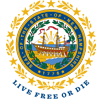Press Release
Contact
(603) 271-3136 | shelly.angers@dncr.nh.gov
This July 4th, have fun but be aware of fire risk
The Fourth of July is a Sunday this year, creating an extra-long weekend of activities for many. But the holiday and its related celebrations also brings with it an increased risk of wildfire ignitions, structural fires and injuries due to burns.
Activities most associated with the Independence Day holiday, including campfires, cookouts and fireworks, all have the potential to start fires that can quickly get out of control.
Even sources not usually associated with starting fires, like overheated landscaping equipment or sparks created by vehicles in fields and forests, can easily ignite a wildfire, threatening life and property.
“More than 90 percent of New Hampshire is still classified as abnormally dry and more than 58 percent is in moderate drought. That means conditions are ripe for wildfires,” said Chief Steven Sherman of the NH Forest Protection Bureau. “Already this year, we’ve seen a marked increase in the number of wildfires caused by human behavior as well as in the level of destruction these fires have caused to structures.
“We hope that everyone will keep in mind that many traditional Independence Day activities produce not just flame but also a high level of heat that can ignite fuels and start a fire, which is sure to take the fun out of the holiday.”
In New Hampshire, fire permits are required for all open burning, including debris fires, campfires and bonfires. Seasonal permits are available for specific locations that may have recurring fires, such as home fire pits and campgrounds. The permits are available online at nhfirepermit.com.
Anyone wishing to have or use fireworks should always check with local fire departments in advance.
The NH Forest Protection Bureau is part of the Department of Natural and Cultural Resources’ Division of Forests and Lands, which protects and promotes the value provided by trees, forests and natural communities. For more information about the Division of Forests and Lands and the work of its Forest Protection Bureau, visit nh.gov/nhdfl or call 603-271-2214.



